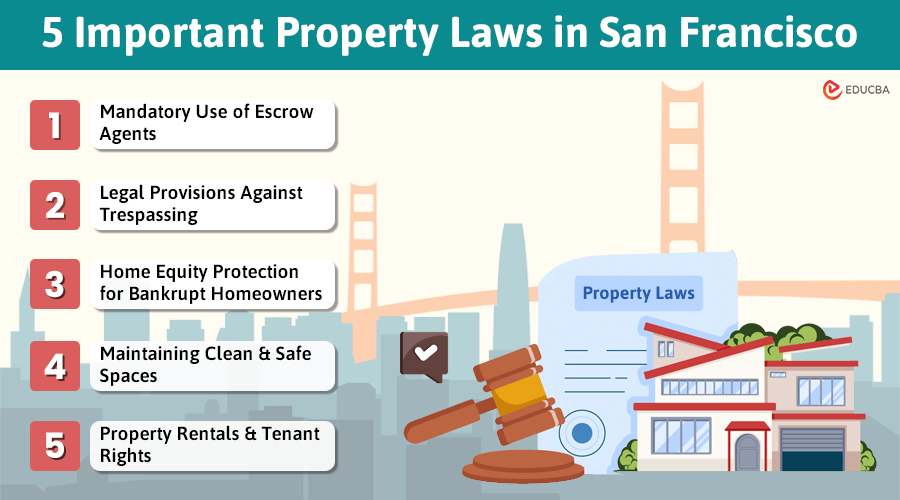Introduction To Property Laws In San Francisco
Buying a house is a dream for many people, but when that dream finally becomes a reality, it can be overwhelming—emotionally, physically, and financially. To smooth the process of transferring property, it is necessary to understand the legal steps involved, including the local and state property laws in San Francisco.
San Francisco, known for its pleasant weather and convenient location, is a popular choice for homeowners. Recent data from the California Association of Realtors shows that property sales in the Bay Area jumped by 19.2% in July 2024 compared to last year. This rise makes it even more important to learn about property laws in San Francisco so you can navigate this competitive market successfully.
5 Important Property Laws in San Francisco
If you are also planning to buy a property in San Francisco, here are some property laws in San Francisco you must know:
#1. Mandatory Use of Escrow Agents
California’s real estate rules mandate using an escrow agent for all property transfers. An escrow agent is a neutral third party who manages the funds and other legal aspects of buying or selling a property until the deal is complete.
These agents are responsible for ensuring that both parties meet their legal requirements. After the buyer pays the escrow funds, the agent keeps the assets and documents safe. The escrow agent then ensures that both sides have completed their obligations before giving the seller the funds and handing the property deed to the buyer.
#2. Legal Provisions Against Trespassing
Homeowners must be aware of the trespassing law, which has strict rules in San Francisco. Anyone entering your property without your consent is considered a trespasser.
For a first-time offense, they could face a fine between $50 and $500. If they trespass again within 24 hours or within 120 days of being found guilty, it becomes a more severe offense. This means they could end up in county jail for up to 6 months and face a fine of up to $500.
#3. Home Equity Protection for Bankrupt Homeowners
San Francisco has strong real estate laws protecting homeowners and their properties. If you go bankrupt, laws are in place to safeguard your personal property. Assembly Bill 1885 protects a portion of the equity in your home from being taken to pay off debts.
To make this process easier, consult with a property lawyer San Francisco. Under sections 704 and 730 of the California Code of Civil Procedure, a single homeowner is exempt from $75,000, while married homeowners are exempt from $100,000.
#4. Maintaining Clean and Safe Spaces
If you own property in San Francisco, you must keep it clean and free from disturbances. Local laws define public nuisance as any situation that can harm the community or environment. This includes things like:
- Accumulating garbage, dirt, or decaying matter
- Storing rotten food
- Keeping hay, paper, or other flammable materials
- Building unsanitary structures
- Harboring pests or insects
- Having vacant areas contaminated with harmful plants or animals, like poison oak or poison ivy.
You could face legal consequences and a significant fine if your property has any of these issues.
#5. Property Rentals and Tenant Rights
Under Assembly Bill 3182, homeowner association (HOA) laws allow at least 25% of homeowners in a community to rent out their units. This new law also restricts short-term rentals, meaning rentals for less than 30 days.
If you do not follow the rules in Assembly Bill 3182, you could face a fine of up to $1,000. If you rent out your building or house, you can raise the rent by a percentage you choose each year. However, it is important to read the Tenant Protection Act to understand your tenant’s rights in case any issues arise.
Final Thoughts
Managing real estate can be challenging, but working with a licensed property attorney can make the process much easier. These professionals guide you through each step, from helping you with the initial paperwork to closing the final deal. They help you understand all the legal requirements and make it easier to deal with the complexities of property laws in San Francisco. With their expertise, you can focus on making your dream of homeownership a reality while minimizing stress and avoiding potential legal issues.
Recommended Articles
We hope this comprehensive guide on property laws in San Francisco helps you navigate the complexities of buying a home in this vibrant city. Check out these recommended articles for additional insights and strategies to make informed real estate decisions.



